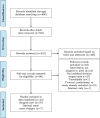Statistical design and analysis in trials of proportionate interventions: a systematic review
- PMID: 30819224
- PMCID: PMC6396459
- DOI: 10.1186/s13063-019-3206-x
Statistical design and analysis in trials of proportionate interventions: a systematic review
Abstract
Background: In proportionate or adaptive interventions, the dose or intensity can be adjusted based on individual need at predefined decision stages during the delivery of the intervention. The development of such interventions may require an evaluation of the effectiveness of the individual stages in addition to the whole intervention. However, evaluating individual stages of an intervention has various challenges, particularly the statistical design and analysis. This review aimed to identify the use of trials of proportionate interventions and how they are being designed and analysed in current practice.
Methods: We searched MEDLINE, Web of Science and PsycINFO for articles published between 2010 and 2015 inclusive. We considered trials of proportionate interventions in all fields of research. For each trial, its aims, design and analysis were extracted. The data synthesis was conducted using summary statistics and a narrative format.
Results: Our review identified 44 proportionate intervention trials, comprising 28 trial results, 13 protocols and three secondary analyses. These were mostly described as stepped care (n=37) and mainly focussed on mental health research (n=30). The other studies were aimed at finding an optimal adaptive treatment strategy (n=7) in a variety of therapeutic areas. Further terminology used included adaptive intervention, staged intervention, sequentially multiple assignment trial or a two-phase design. The median number of decision stages in the interventions was two and only one study explicitly evaluated the effect of the individual stages.
Conclusions: Trials of proportionate staged interventions are being used predominantly within the mental health field. However, few studies consider the different stages of the interventions, either at the design or the analysis phase, and how they may interact with one another. There is a need for further guidance on the design, analyses and reporting across trials of proportionate interventions.
Trial registration: Prospero, CRD42016033781. Registered on 2 February 2016.
Keywords: Adaptive intervention; Adaptive treatment strategy; Complex intervention; Proportionate intervention; Proportionate universalism; Sequential multiple assignment randomised trial; Stepped care; Systematic review; Trial.
Conflict of interest statement
Ethics approval and consent to participate
Not applicable.
Consent for publication
Not applicable.
Competing interests
The authors declare that they have no competing interests.
Publisher’s Note
Springer Nature remains neutral with regard to jurisdictional claims in published maps and institutional affiliations.
Figures




Similar articles
-
Folic acid supplementation and malaria susceptibility and severity among people taking antifolate antimalarial drugs in endemic areas.Cochrane Database Syst Rev. 2022 Feb 1;2(2022):CD014217. doi: 10.1002/14651858.CD014217. Cochrane Database Syst Rev. 2022. PMID: 36321557 Free PMC article.
-
The future of Cochrane Neonatal.Early Hum Dev. 2020 Nov;150:105191. doi: 10.1016/j.earlhumdev.2020.105191. Epub 2020 Sep 12. Early Hum Dev. 2020. PMID: 33036834
-
Behavioural modification interventions for medically unexplained symptoms in primary care: systematic reviews and economic evaluation.Health Technol Assess. 2020 Sep;24(46):1-490. doi: 10.3310/hta24460. Health Technol Assess. 2020. PMID: 32975190 Free PMC article.
-
Beyond the black stump: rapid reviews of health research issues affecting regional, rural and remote Australia.Med J Aust. 2020 Dec;213 Suppl 11:S3-S32.e1. doi: 10.5694/mja2.50881. Med J Aust. 2020. PMID: 33314144
-
Statistical considerations for testing multiple endpoints in group sequential or adaptive clinical trials.J Biopharm Stat. 2007;17(6):1201-10. doi: 10.1080/10543400701645405. J Biopharm Stat. 2007. PMID: 18027226
Cited by
-
Personalising airway clearance in chronic suppurative lung diseases: a scoping review.ERJ Open Res. 2023 Jun 19;9(3):00010-2023. doi: 10.1183/23120541.00010-2023. eCollection 2023 May. ERJ Open Res. 2023. PMID: 37342087 Free PMC article.
-
Sequential multiple assignment randomized trial studies should report all key components: a systematic review.J Clin Epidemiol. 2022 Feb;142:152-160. doi: 10.1016/j.jclinepi.2021.11.007. Epub 2021 Nov 8. J Clin Epidemiol. 2022. PMID: 34763037 Free PMC article.
-
Social mobility and healthy behaviours from a gender perspective in the Spanish multicase-control study (MCC-Spain).PLoS One. 2021 May 12;16(5):e0251447. doi: 10.1371/journal.pone.0251447. eCollection 2021. PLoS One. 2021. PMID: 33979362 Free PMC article.
-
A randomized controlled trial of a proportionate universal parenting program delivery model (E-SEE Steps) to enhance child social-emotional wellbeing.PLoS One. 2022 Apr 4;17(4):e0265200. doi: 10.1371/journal.pone.0265200. eCollection 2022. PLoS One. 2022. PMID: 35377882 Free PMC article. Clinical Trial.
-
First STEPS: Primary Outcomes of a Randomized, Stepped-Care Behavioral Clinical Trial for Parents of Young Children With New-Onset Type 1 Diabetes.Diabetes Care. 2022 Oct 1;45(10):2238-2246. doi: 10.2337/dc21-2704. Diabetes Care. 2022. PMID: 35997261 Free PMC article. Clinical Trial.
References
-
- Marmot MG, Allen J, Goldblatt P, Boyce T, McNeish D, Grady M, Geddes I, et al.Fair society, healthy lives: Strategic review of health inequalities in England post-2010. The Marmot Review. 2010.
-
- Medical Research Council. Developing and evaluating complex interventions: new guidance. https://www.mrc.ac.uk/documents/pdf/complex-interventions-guidance. Accessed 14 May 2017.
-
- Lancaster G, Campbell M, Eldridge S, Farrin A, Marchant M, Muller S, Perera R, Peters T, Prevost A, Rait G. Trials in primary care: statistical issues in the design, conduct and evaluation of complex interventions. Stat Methods Med Res. 2010;19(4):349–77. - PubMed
Publication types
MeSH terms
Grants and funding
LinkOut - more resources
Full Text Sources
Medical

